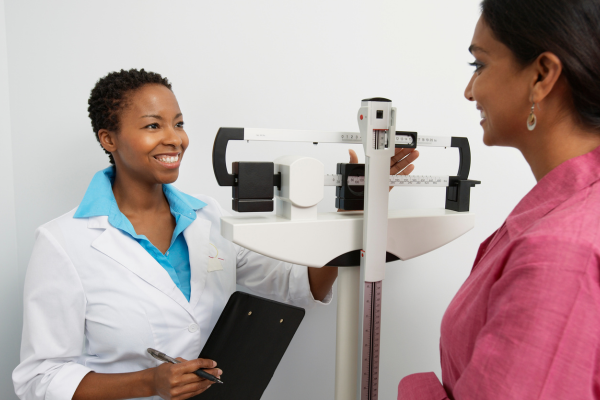August 17, 2023
Discover the impact of BMI on transplants and health.
What is BMI, why do transplant centers care about it, and how can you reach a healthy weight? Golnaz Ghomeshi Friedman, a renal dietitian and certified clinical transplant dietitian, Melanie Pina, a peritoneal dialysis patient, and Carol Murray, a living kidney donor, discuss this and more.
What is BMI?
BMI stands for body mass index. It is an estimate of body fat based on height and weight.
There are four BMI categories:
- Underweight: Less than 18.5
- Normal weight: 18.5–24.9
- Overweight: 25–29.9
- Obesity: BMI of 30 or greater
"The calculation is your weight in kilograms divided by your height in meters squared," said Friedman. "BMI is a good screening tool because it's a quick calculation with information that we typically have on people, like their height and weight."
However, it doesn't tell healthcare professionals about that specific individual, their characteristics, or body composition (how weight is distributed).
For example: Two five-foot and three-inch tall people who weigh 130 pounds would have the same BMI but could look vastly different from each other.
Many centers rely solely on BMI, but others have begun using it with other measurements like central adiposity.
Central adiposity is the accumulation of fat in one's midsection. The amount of weight someone carries around their stomach compared to height can be a good indicator of future health issues.
"We know there are people at a higher weight and BMI that are healthy, meaning they don't have diabetes or pre diabetes, their blood pressure is well controlled, they eat well, and they exercise regularly. That's why we want to look at the entire patient, in addition to weight."
Subscribe today!
Join the NKF Blog Newsletter
Get inspirational stories and kidney disease resources delivered to your inbox every month. You'll gain practical insights and expert advice to help you better understand and manage your kidney health, no matter where you are on your kidney journey.
Why do transplant centers care about weight?
Weight is used to determine surgical risks for the donor and recipients.
"Each transplant center determines the weight limitations for recipients. Some use BMI, others use BMI in addition to central adiposity. Some don’t use BMI at all, “Friedman said. "Some have absolute contraindication, meaning you cannot get a transplant if your BMI is above a certain number."
One of the biggest risks, infection after surgery, is directly tied to weight, but in a way that may surprise you.
A transplanted kidney is placed in the lower abdomen. That tends to be where many people carry a lot of weight. More weight in that central region can complicate the surgery because the surgeon has to make a much bigger incision to place the kidney. The more tissue and fat cut through, the higher the risk of bleeding, infection, and other surgical complications.
"Transplant recipients have to be on medications that suppress their immune system so that they don't reject the new kidney," said Friedman. "Those medications make it hard to fight infection. So, if the transplant recipient gets an infection from the larger surgical wound, the body can't fight it off."
There is also some evidence of long-term complications for transplant recipients at higher weights.
"Individuals with a higher weight at the time of transplant may experience delayed graft function, meaning they may require dialysis after transplant, than those at a lower weight. There may also be a higher risk of death," Friedman said. "Weight in the middle is also correlated with a higher risk of developing diabetes or high blood pressure, the main causes of kidney disease."
The risk of developing diabetes or high blood pressure is also why transplant centers care about the weight of kidney donors.
"We want donors to have the lowest risk of developing diabetes or high blood pressure as possible," said Friedman. "We want them to live the longest, healthiest life they can with a single kidney."
Learn more about weight before and after a kidney transplant.
How can you safely lower your weight?
Potential donors and transplant recipients can safely lose weight in many ways, including:
- Working with a dietitian to create a healthy diet plan
- Exercising
- Weight loss surgery.
For Carol Murray, a kidney donor to her husband, exercise and diet helped her shed enough weight to become a living donor.
"Overall, I was healthy. My blood pressure was spot on. I did not have diabetes, but I knew my BMI was at an unhealthy level," Carol said. "I needed to lose 65 pounds."
Carol exercised more frequently and cut back on carbohydrates.
"Working to lose weight and lower my BMI helped me as much as him,” said Carol. “While it didn't feel like it was happening quickly, I lost about a pound per week."
After eight months, Carol reached her goal BMI and donated to her husband. It's been four years since then, and she and her husband are thriving.
Some, however, cannot lower their BMI through diet and exercise alone. They may find weight loss surgery helpful.
Types of weight loss surgery
- Gastric sleeve: A portion of the stomach is removed, so the stomach is smaller. This can change your hormones in terms of your fullness and satiety hormones. It is a non-malabsorptive surgery, meaning you can still absorb nutrients.
- Gastric bypass: A portion of the stomach and intestine is removed. Food bypasses some of the intestines where nutrients are absorbed. The less you absorb, the less weight you gain.
Melanie Pina, a peritoneal dialysis (PD) patient, gained weight from the PD sugar solution despite eating well and exercising. She opted for weight loss surgery.
"I gained fifteen pounds in four months. My BMI went up, and I was knocked off the transplant waitlist. I was frustrated because I didn't have blood pressure issues or diabetes. I was healthy," said Melanie. "I spoke to a nephrologist, heartbroken, because I didn't know what to do. They suggested weight loss surgery."
The weight loss surgeon was the first professional who made Melanie feel seen.
"As someone who was big their whole life, you feel invisible. He made me feel seen," she said. "He explained that bigger people can be healthy, and skinnier people can be unhealthy. He reiterated that my weight wasn’t due to laziness."
Melanie's surgeon explained that many factors affected her health and recommended a gastric sleeve.
"I wanted the gastric bypass, but he explained that gastric sleeves are better for people who take pills because of the absorption. I met with a nutritionist and psychologist, who asked if I had an eating disorder and what my relationship with food was like,” Melanie said. “Had I gone through the weight loss surgery a few years ago, it wouldn't have worked because it isn't a quick fix. You still have to put the work in. It is just a tool that aids you."
Melanie returned to normal four days after the surgery.
"It was an amazing experience. I cried after the surgery because I knew my life was going to change," she said. "Two months later, my BMI dropped enough to get back on the transplant waitlist.”
Wondering how to become a kidney donor or get onto the kidney transplant waitlist? Sign up for the Kidney Learning Center.
Ask questions and get answers
Our Patient Information Help Line, NKF Cares, supports people affected by kidney disease, organ donation, and transplantation. Call toll-free at 855.NKF.CARES (855.653.2273) or email nkfcares@kidney.org.
Looking for the latest in kidney research, care, and treatment?
Subscribe to Hot Topics in Kidney Health, the podcast that examines important kidney topics, brings in the experts, and provides actionable tips you can use today.


















